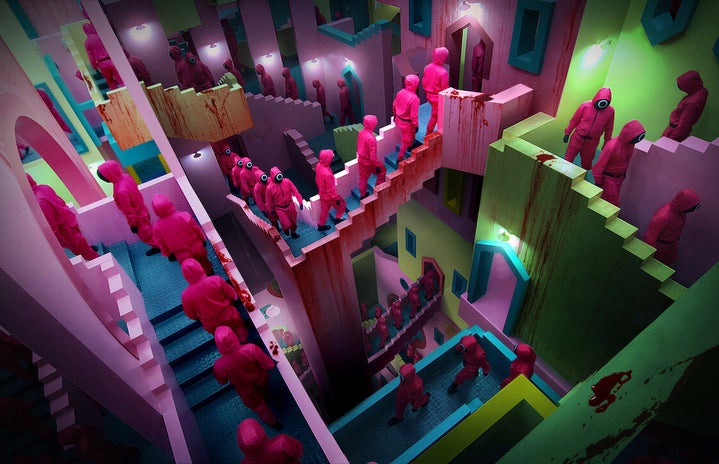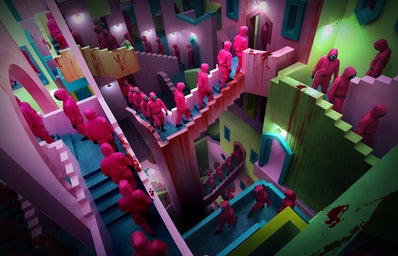Squid Game. The two oddly paired words that everyone’s either asking if you’ve watched or telling you to. It is, of course, the new South Korean survival drama that’s plastered on our social media feeds, and as we know, nothing reveals a show’s success quite like dedicated memes pages and fan edits.
The series follows 456 Seoul residents in a contest that promises to pay off their debt, and then some. If they win, they receive a whopping 45.6 billion won ($39 million). The pretty sadistic twist? The blood-thirsty games are based on traditional Korean children’s games, giving the show a sobering undertone on just how far most of us as adults stray from the innocent ambition of our childhood. However, the concept of gory games being played for the pleasure of an elite group isn’t foreign to viewers. The show directed by Hwang Dong- Hyuk has been compared to well-known dystopian films such as ‘The Hunger Games’ and ‘Battle Royale’.
So, what really is it about the show that’s made it a number one hit on Netflix in over 90 countries?
Actor Wi-Ha Joon, who played the shows police officer Joon-ho, hit on two very salient points when asked about his thoughts on the show’s popularity on The Tonight Show. He put it down to the series honest portrayal of raw human greed and nature, paired with the shock factor of the Korean children’s games. Let’s break it down.
- Human Characters
Aside from the momentum of the plot, what arguably really kept people gripped was the emotional lives and backstories of the characters who seldom solely played for the money but rather what the money represented. What did it represent? The wellbeing of their friends and family, and the ability to experience life with some stability. Sentiments we all can relate to. Additionally, the characters were also flawed, they made some catastrophic mistakes like the protagonist Seong Gi-Hun, who starts the show by robbing from his own mother. But this functions just to make them all the more relatable; viewers are comforted that there’s always another chance to change and do good. This idea fed even into the series’ well-tuned subplots. The masked, anonymous men helping to control the game appear just as strapped for cash as the players, as they harvest the organs from them for money. In Squid Game everyone apart from the elite have solidarity in their desperation.
2. Children’s Games / Bright Setting
As Wi- Joon alluded to, the use of children’s games makes the shows more shocking and therefore enticing for viewers. However, I feel it goes further than this and that the use of horror and bloodshed against the backdrop of a bright and colourful set is an aspect we viewers are becoming more drawn to in our film and television. There is something more haunting about atrocities being played out in daylight and there being no means to stop them from unfolding- a technique also seen in the popular ‘Midsommar’ as directed by Ari Aster.
To sum it up, Squid Game hits us right where it hurts, to the core of our fears; of our childhood visions for life being destroyed by those in positions of power and extreme wealth. Squid Game left us all with the question: what metaphoric games are we involved in, in the pursuit of money?


